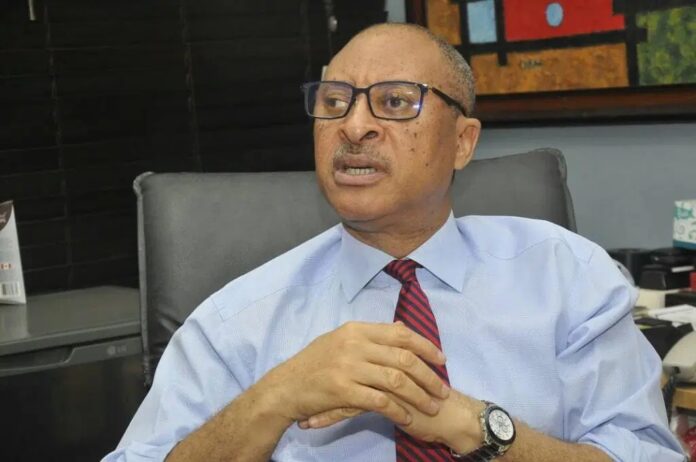“You say you love the rain
but you open your umbrella.
You say love the sun
but you find a shadow spot.
You say you love the wind
but you close your windows
This is why I’m afraid when you say you love me”
William Shakespeare
Boney Akaeze
Recently, Prof. Pat Utomi; a professor of Political Economy, management consultant and progressive politician announced the plan of the Big Tent Coalition to unveil a shadow cabinet According to the erudite scholar, the shadow cabinet initiative is a national emergency response aimed at monitoring the performance of the Federal Government, identifying policy failures and proposing alternative solutions across key sectors. The head of the Big Tent Coalition further emphasized that the coalition would serve as a civic accountability structure rather than a political threat.
However; the Nigerian State views this initiative of The Big Tent Coalition differently. In a swift response against the initiative, the Department of State Services (DSS) on the 13th day of May and obviously acting for and on behalf of Mr. President and not actually the wider State they are meant to serve, dragged Prof. Pat Utomi to the Federal High Court in Abuja over the averred plan to launch the shadow cabinet initiative. In the suit filed against this attempt to shadow the All Progressives Congress led Federal Government, the secret police contended that Prof Utomi’s move is intended to cause chaos and destabilize the country. The secret police further emphasized that the planned opposition strategy was not only an aberration but constituted an attack on the Constitution of the Federal Republic and a threat to the democratically elected government currently in place in the country. However; the shadow cabinet initiative is in the considered opinion of the Prof. Utomi led group, a civic and lawful move within the framework of the role and strategies of functional opposition parties in a democracy particularly as an effort towards entrenching democratic governance in the country.
Putting this conversation in context, two things should be interrogated namely; what is a shadow cabinet? And why should a mere mention of launching it unsettle the Federal Government?
A shadow cabinet is a concept derived from the textual meaning of the term shadow in which it implies mirroring or resembling function. A shadow cabinet flowing from this contextual definition therefore implies a team of non-state actors, but interested party point persons, mirroring and scrutinizing a substantive and legitimate cabinet or extant government. It is a civil initiative with two fundamental objectives.
Firstly, it is a transparency and accountability tool deployed by opposition political parties and civic groups essentially to mirror the performance of the government in power. In this context, a shadow cabinet is used to effectively scrutinize the policies and overall performance of the incumbent cabinet, expose the flaws in such policies and propose alternative policies and line(s) of action. For the opposition parties, the overarching task of the individual members of such a shadow cabinet is to demonstrate to the electorate, the knowledge and capacity of the opposition party in key sectors of government. Their point persons are therefore assigned to shadow specific sectors of the State which they must objectively critique and recommend expert policy alternatives that are potent and sustainable solutions to societal problems with root cause(s) traceable to the sector on which they have kept a watch.
Secondly; the concept embodies the principle of plurality as a cardinal tenet of a functional democracy, and the idea that a functional opposition party is an alternative government in the waiting. It is therefore to get the selected opposition team prepared for the practical task of governance. The initiative is therefore not only used to demonstrate to the electorate, the readiness of the opposition to efficiently run the government, should their party win election and form the government, it also serves as hands-on training opportunity for persons in the opposition who are likely to become substantive cabinet members in the nearest future. Furthermore; the idea shows that while engaged in political campaigns, the opposition is also getting prepared for the practical task of effectively running the business of government. The team is more often than not, composed of sector experts (technocrats).
The concept is a time honoured practice in the United Kingdom (UK) and other parliamentary democracies among countries such as Canada, New Zealand and Australia. In the UK, the main opposition party with special reference to its shadow cabinet is called His (or Her) Majesty’s Loyal Opposition. This is because it is acknowledged by the government that the shadow cabinet by its opposition to His (or Her) Majesty’s Government does not dispute its legitimacy (the legitimacy of His or Her Majesty’s Government)
In the Westminster model, senior members of the opposition party in parliament act as spokespersons or shadow ministers. Collectively they form the frontbench or shadow cabinet of the party. They are assigned the task to scrutinize the ministers they shadow in the current government and recommend alternative policies to counter and identified flaws in both the framework and outcome of policy choices of the Government. Today; this democratic accountability tool has been embraced globally by countries where politicians have come to terms with the imperative of open government as the bedrock of good governance and sustainable development.
In Japan, the shadow cabinet is referred to as the ‘Next Cabinet’ meaning de facto cabinet. In Germany, the shadow cabinet is known as Board of Experts and Advisors (Team of Experts/Komettenzteam) or the alternate team. In Hungary, the Democratic Coalition led by Kiara Dobrai formed a shadow cabinet in 2022. In Turkey, the Republican Peoples’ Party popular known as the CHP (Turkish: Cumhuriyet Haik Partisi) as the main opposition formed a shadow cabinet in 2023. In India, shadow cabinets have been in practice at the sub-national level and formed by opposition parties as well as civil society organizations (CSOs) but since last year, the urgency for the practice at the national level has been vocally pushed by prominent figures in the country. In their published article captioned, From Critique to Construct: The of Role Shadow Cabinet in India’s Future, Vishal Valhav and Samear Goyal revealed that the advocacy to institutionalize the practice in the Indian parliament has been given traction by prominent public figures in the country.
In an interview on LiveNow from FOX News, Congressman Wiley Nickel D-North Carolina declared, “we need new ideas,” “democrats have to stop playing defense and start going on the offensive”. It’s not enough to say we’re against Trump and his Project 2025 Agenda. We have to say what we’re for, and that’s what’s really behind this idea to get folks there to counter every cabinet agency, every position that Trump appoints.” In another development, Bill Scher in his recent article titled, “21 Unexpected Heavy Hitters for a Democratic Shadow Cabinet published in the opinion page of the Politco Magazine, wrote that as Democrats cast about for a strategy to thwart President Donald Trump’s agenda, rebrand their party and take back power, Sen. Elissa Slotkin (Michigan Democrat) has offered an intriguing idea: Build a Shadow Cabinet. According to Scher, the shadow cabinet as envisioned by Sen. Elissa could be composed of the ranking members of Congressional Committees who could then take the lead in challenging the Trump’s administration.
Although Scher viewed this recommendation as an effective strategy for Democrats to flood the media zone and deliver a coordinated response to Trump’s wild manoeuvres, he was strongly of the opinion that neither the ranking Congress members nor the crop of thirsty presidential aspirants should be put forward for the strategic assignment. To him, the ranking Congress members aren’t the fresh new faces to give the Democratic Party a sleek new look; he contended that everything said would be parsed as self-serving motivation and thereby distracting from the party’s broader task at hand. It was on the strength of these points that he recommended that the de facto cabinet should be composed of top accomplished people with the ability to speak plainly and the credibility to puncture the Trump administration’s often Orwellian narratives. In conclusion, he left the Democrats with an admonition; “Don’t limit members of the shadow cabinet to professional politicians. Pitch a big tent and don’t draw rigid ideological line.”
From the above expositions, the reaction of the federal government to the formation of a shadow cabinet in Nigeria as a social reconstructionist thought by the Big Tent Coalition is to say the least, a sad reality in our democratic journey. This is especially in the light of the fact that this clear onslaught against organized opposition is coming from the regime led by President Bola Tinubu who came to power through sustained opposition politics and who claims to wear the tag of a pro-democracy activist as his proud political epithet and badge of honour. It is indeed a sad arrival at a critical juncture for those herdlike and infatuated followers of the Jagaban of Borgu because they can no longer live in illusion as the bright day has brought forth the adder and like the Shakespearian Brutus, their genius and mortal instruments are in a phantasma or hideous dream and they should no doubt be experiencing psychological distress and internal crisis like the metaphorical Shakespeare’s little kingdom under insurrection.
This is a government of a self-acclaimed congress of progressives, but running the most reactionary administration in Nigeria’s contemporary history. It is the party that had a field day ridiculing an incumbent President with street protests and campaign of calumny without let and hindrance but which is now ever determined to infiltrate, manipulate, dazzle and crush any sign of opposition. They loved free, fair and credible elections but now election malfeasance is their Party’s pride. They loved street protests but they now fire live bullets at citizens who protest against bad governance, poverty and hardship. They loved free speech and freedom of expression but now they are intolerant of other voices. They loved constitutionality and the rule of law, and were very active in the anti-military rule struggle in this country, but now that they’re in power, they are detectors and demagogues acting unconstitutionally and anti-democratically. They were avowed democrats while in opposition but now scared of any form of scrutiny while in power. What a ridiculous paradox!
Surely; a cat with nine lives can only be trusted by either those undiscerning folks or some timid bondsmen who, in their mental indolence, expect their manumission to come as a benevolent gesture from their iniquitous and cruel master. Such delusion is akin to expecting an apex predator like the lion to become a vegetarian.






